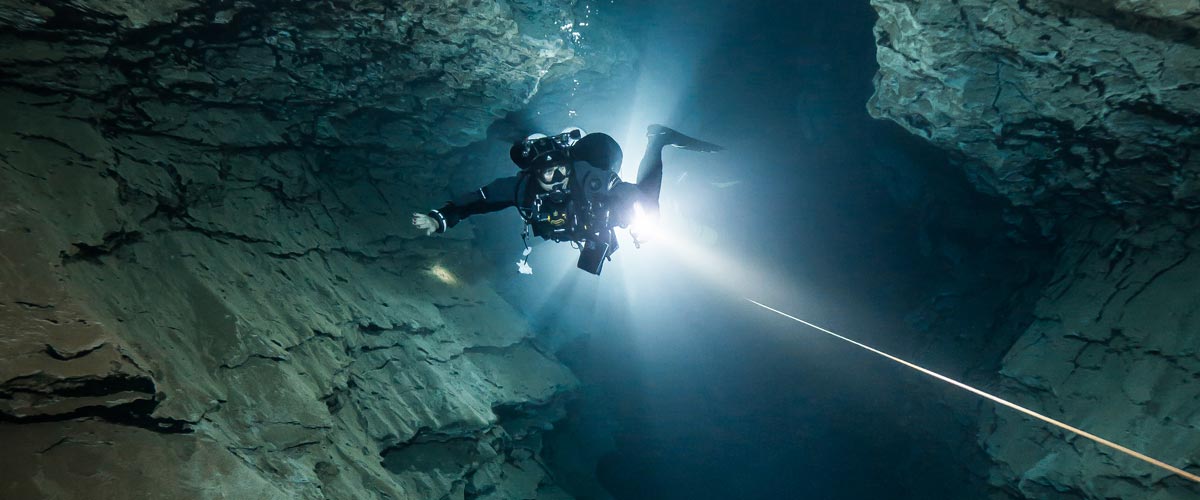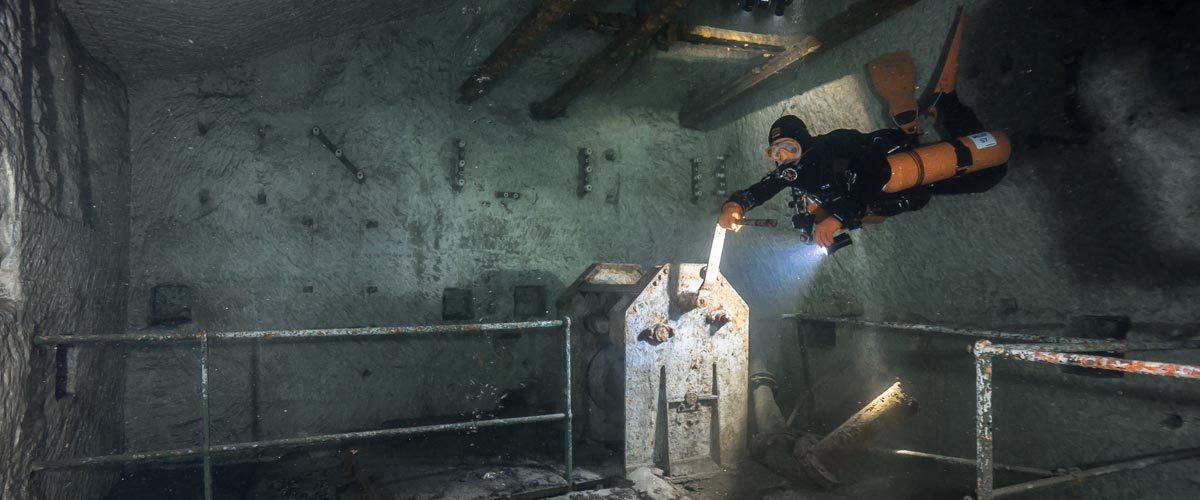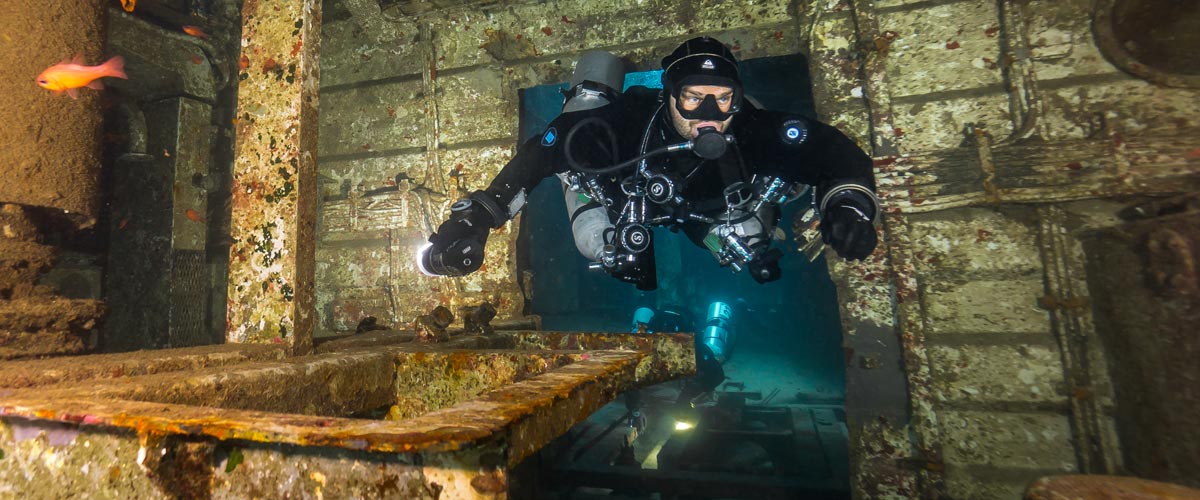Dive Training Blogs
How long does it take to become a GREAT Dive Instructor?
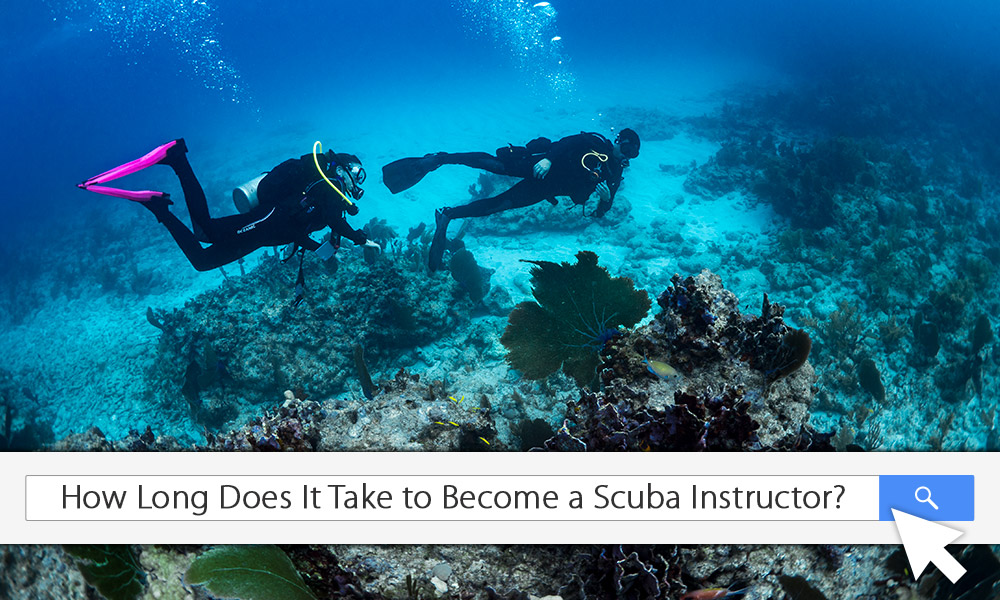
By: Jon Kieren
As an Instructor Trainer, I am often asked about the process and timeline to become an SDI Open Water Scuba Diving Instructor. The easy way to answer is to quote the minimum standards as listed in the SDI Standards and Procedures (also found on the SDI course description page HERE), and begin the discussion about getting a course scheduled. With so much buzz in the industry lately about degradation of training at all levels, I felt it would be beneficial to write about what the MINIMUM standards set by most training agencies (as well as the WRSTC) really mean and what it REALLY takes to become a GREAT dive instructor.
The “zero to hero” Open Water diver to instructor flow path
Personally, I am a product of the “zero to hero” Open Water diver to instructor flow path. I was an inexperienced open water diver with less than 20 dives spread out over about six years when I decided I wanted to become a dive instructor. I walked into my local dive shop in Wisconsin, and informed them that I was moving to the Virgin Islands in 4 months, and I wanted to work there as a dive instructor. 3 and half months later, I was an Open Water Instructor and ready to get on the plane. Fast forward 9 years and I am a rebreather and cave instructor, advanced trimix instructor trainer, and instructor trainer evaluator. Those 15 years of diving and teaching have included a lot of mediocre courses taught, hard lessons learned and, frankly dangerous situations that I am lucky to have escaped without incident. Many of those situations presented themselves because I simply did not know what I didn’t know due to inexperience. I met all the minimum requirements set by the training agencies as I progressed, but I never really understood what that minimum requirement meant and who it was for.
To set these minimum standards, a group of people (not always active instructors or even active divers) sit in a room and decide what the minimum requirement should be for any standard based on the best-case scenario to create a competent diver or instructor at a given level. This means perfect conditions (warm, calm, and clear water), perfect students (comfortable in the water, excited to be there, actively engaged in the training, etc.), no equipment issues, and no distractions. It’s not entirely realistic, but it’s a minimum standard, a starting point. From there, it is intended that instructors and trainers add time, skills, assistants, and reduce ratios, etc. based on the not so optimal situations they are presented with.
So, if the industry’s minimum standards aren’t universally enough, how long should it take? I don’t think that can really be answered in years, number of dives or certification cards. My experiences have shown that what is far more valuable is time in the water in varied conditions and a professional’s drive to improve themselves.
If you’re just taking courses to check off boxes you never have time to apply your knowledge
Those who take courses to check off boxes and just move on to the next level never really have an opportunity apply the knowledge and skill set, and it never really sinks in. I’ve heard a lot of people advise that an aspiring instructor jump straight from their divemaster course into the instructor development course because the DM info and skills are “fresh” so the candidate will have an easier time regurgitating the information. I can understand that theory, but it’s a scary thought that a DM with little to no practical experience working with students and guiding divers would have an easier time in an IDC than a seasoned professional. That would make me question the quality of the DM program and whether that information has truly been mastered by the candidate.
My personal advice to aspiring dive instructors? Knock out a couple hundred or so dives in varied conditions (not just your local quarry or even just warm water vacation diving), and go through your DM course. Spend a year or so working actively as a DM, crewing dive boats and assisting classes and continue to develop your own personal diving skills by taking diver level courses. Even if you aren’t interested in technical diving, take an intro to tech class, for example. Growing your personal knowledge base and experience in different facets of diving will give you a better perspective of how and why to teach many of the basics. On top of that, you will have the opportunity to learn from more experienced instructors who will be valuable mentors in your growth as a professional.
As a newly minted educator, start slowly
Once you have built a well-rounded foundation of true diving experience, select an instructor trainer that you know personally and respect as an educator. Your IDC should not be a “read the bullet points out of the instructor guide” process, but one that takes the knowledge, skills and experience you have as a dive professional and uses it to mold you into an educator. As a newly minted educator, start slowly. Work with small groups of students (1 or 2) at the entry level, and take time after each class to reflect on how things went and where you can adjust to improve the next time around.
Continue to develop your instructional skills by taking specialty instructor courses
Many agencies allow “experience based” upgrades, which is fine for average instructors. But if you truly want to be a great educator, learn from an IT that has experience teaching at that level. Trust me, you’ll pick up some valuable tips on how to teach more effectively at that level.
So, to answer the original question, “how long does it take to become a great dive instructor”? The answer is “forever”. Becoming a great instructor is something we should always strive for, but also know that there will always be something more for us to learn no matter how experienced we are. Take your time and enjoy the ride; the journey is the best part and as dive instructor, you can make that journey last a lifetime.
To find out more about International Training, visit www.tdisdi.com.

Blogs
Intro to Tech: What is it about?
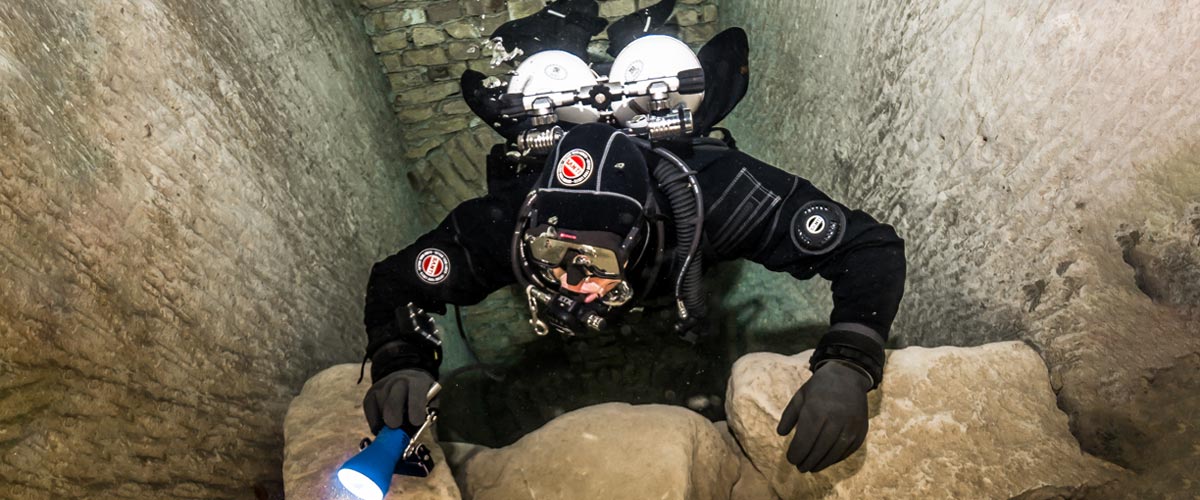
Article by José Pablo Mir
Pictures by Cezary Abramowski
The world of technical diving is exciting. It opens the door to new sites, depths, and bottom times. More importantly, it opens our minds to a new way of planning, facing, and experiencing dives, even those not purely technical.
Becoming a technical diver is a process, and like in other aspects of life, we should find the proper entry point that suits us best based on our knowledge and experience. The Introduction to Technical Diving course from TDI -the world’s largest and most recognized technical diving teaching organization- is the best option for divers who have yet to gain experience in the fundamental aspects of this new practice. The course’s content and its embrace of new techniques and technologies make it possible to acquire a solid foundation to learn and gain experience in this practice properly.
Becoming a technical diver is not something that happens overnight, whether deciding to become one or receiving a certification card stating we are now technical divers. It is a slow process extending farther away than any introductory course. It requires effort and dedication. But it will bring us satisfaction from day one -or two.
It is a matter of mentality
First, we must understand and accept that technical diving, involving greater depths, longer bottom times, exotic gases, virtual or real ceilings, and more, comes with higher levels of risk than the sport diving we have been practicing until now.
Although this discussion usually starts with a warning about risks, as I’ve done in the previous sentence, our practice is not a game of chance.
Technical diving is a rational activity that requires maturity and good judgment, and we will put everything into ensuring that each dive is a successful one -meaning we return from it safe and sound. With this understanding, we will strive to establish a mental attitude more aligned with our practice and its realities.
This new “technical diver” mindset we will develop will lead us to be more cautious in our executions, more analytical in our plans, more rational in our strategies, and more detailed in our procedures.
Experience will keep teaching us to know ourselves better, to keep our anxiety and other emotions under control, and to manage our impulses. Over time, our senses will sharpen, and we will be more attentive to the particulars of the situation we find ourselves in.
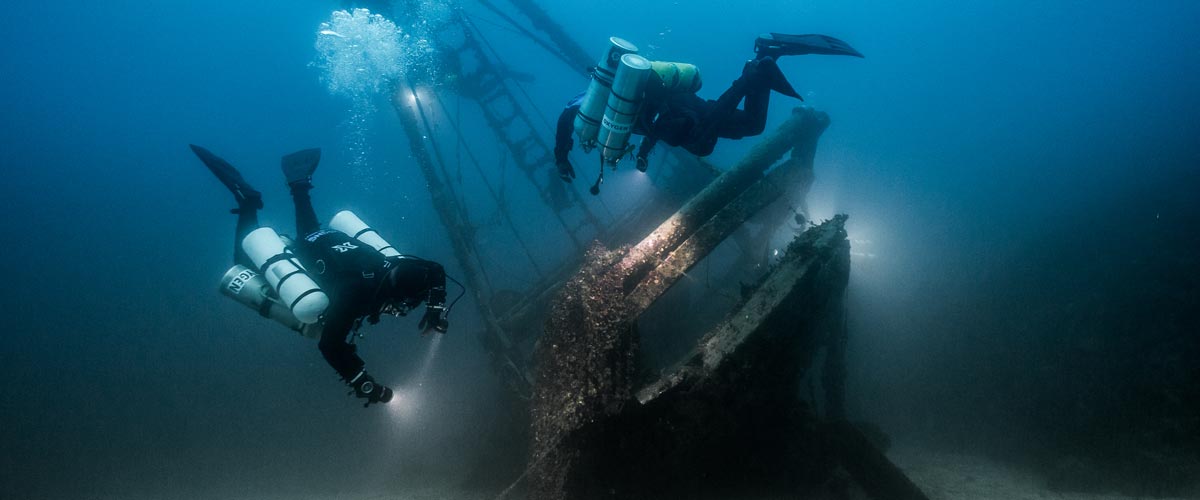
Strategies and procedures
Our strategies, those broad guiding lines tracing the path to follow, from how to approach planning to where, with what, and how we are willing to get there, will be more specific and more practical. Not because they magically become so, but because we will consciously and deliberately frame them that way.
We will establish clear, concise, and realistic procedures. Not only for the undesirable situations that may present themselves but also for those that are part of our dive objectives.
Even though, as technical divers, we often use equipment different from what we were previously accustomed to, it is essential to note that the gear does not make the diver. In a way, we could consider such equipment as the necessary tools to implement what our goal seeks to achieve, according to our strategies and procedures.
Technique plays an important role
We must put our greatest effort into learning and perfecting the different techniques we will be acquiring. Buoyancy, trim, propulsion, cylinder handling, deploying DSMBs and lift bags, valve drills, and more are essential skills we must begin to master to progress in our art. What we cannot do, when we need to do it, can harm us.
Our techniques must be effective and achieve the purpose for which they were devised. But they must also be efficient and require the least resources possible, including the time they take and the effort they demand. Effectiveness and efficiency will prevail over beauty and other considerations that may come to mind, although none of them should be mutually exclusive. A technique executed efficiently and effectively tends to have an inherent beauty.
Refining techniques is a lifelong mission. Some of them will be easy to master from the go; others, on the other hand, will be our life mission and will require many repetitions just to resemble the idea we have in mind of how they should be executed.
We must consider the environment
Our learning, the needs and musts of the practice we engage in, the experience we gradually gain, our strategies and procedures, and even our equipment and tools change with the environment.
Diving in the ocean, everything about us must be suitable for ocean dives. Conditions there rarely emulate those found in a pool, lake, or river. Variable winds and currents, greater depths, visibility conditions, other divers with uncertain skills around us, marine life, maritime traffic, distance from the coast, and many other factors add complexity and uncertainty.
It is never necessary to master the pool on the first day, but planning and aspiring to gradually cope with the ocean’s conditions is essential.
The cost of good training
We are aware that our resources are often scarce in relation to the possibilities of use we could give them if they were not. To a greater or lesser extent, we are part of the economic reality in which we are embedded.
Fortunately, the cost of good technical diver training is not an entry barrier. Comparing training and equipment costs, we see that the former are generally lower. Yes, lower cost for personalized service, essential to our future
performance and safety, than for a series of mass-produced products that are mere, albeit necessary, tools for an end.
The value of good training
The value of the training we received encompasses a range of characteristics, from emotional and methodological to technical and technological. TDI and its Introduction to Technical Diving course offer a deep and modern approach, with a teaching strategy that aims to create thinking divers, not merely obedient ones.
As technical divers, our knowledge is our primary tool. In this type of activity, what we don’t know can harm us.
Is this course optional?
Unfortunately, the fact that this Introduction to Technical Diving course is not a prerequisite for any subsequent training is an invitation to consider it optional. And we all know what usually happens to “optional” under budget constraints.
However, this course should be seen as optional only by those divers who are somehow familiar with the use of technical equipment, who have a mindset more in line with the requirements of this type of diving, who plan and execute the dives the proper “technical” way, who know their gas consumption rate, who are not intimidated by non-decompression tables, who feel comfortable using their dive computers, and know the techniques and have at least an acceptable level of buoyancy, positioning, and propulsion. Those can go straight to a more advanced training course, such as TDI’s Advanced Nitrox.
We must ask ourselves whether or not we are in that group.
Remember our goal: to have fun
Recreational diving is our passion. Jumping into the water carrying heavy equipment and having properly dotted our I’s and crossed our T’s have only one ultimate goal: fun. This is the activity we have chosen as a hobby. We must enjoy it; it must give us pleasure and make us vibrate.
Having a good time is not optional!
Blogs
Four opportunities to go pro in 2024 with Dive Friends Bonaire
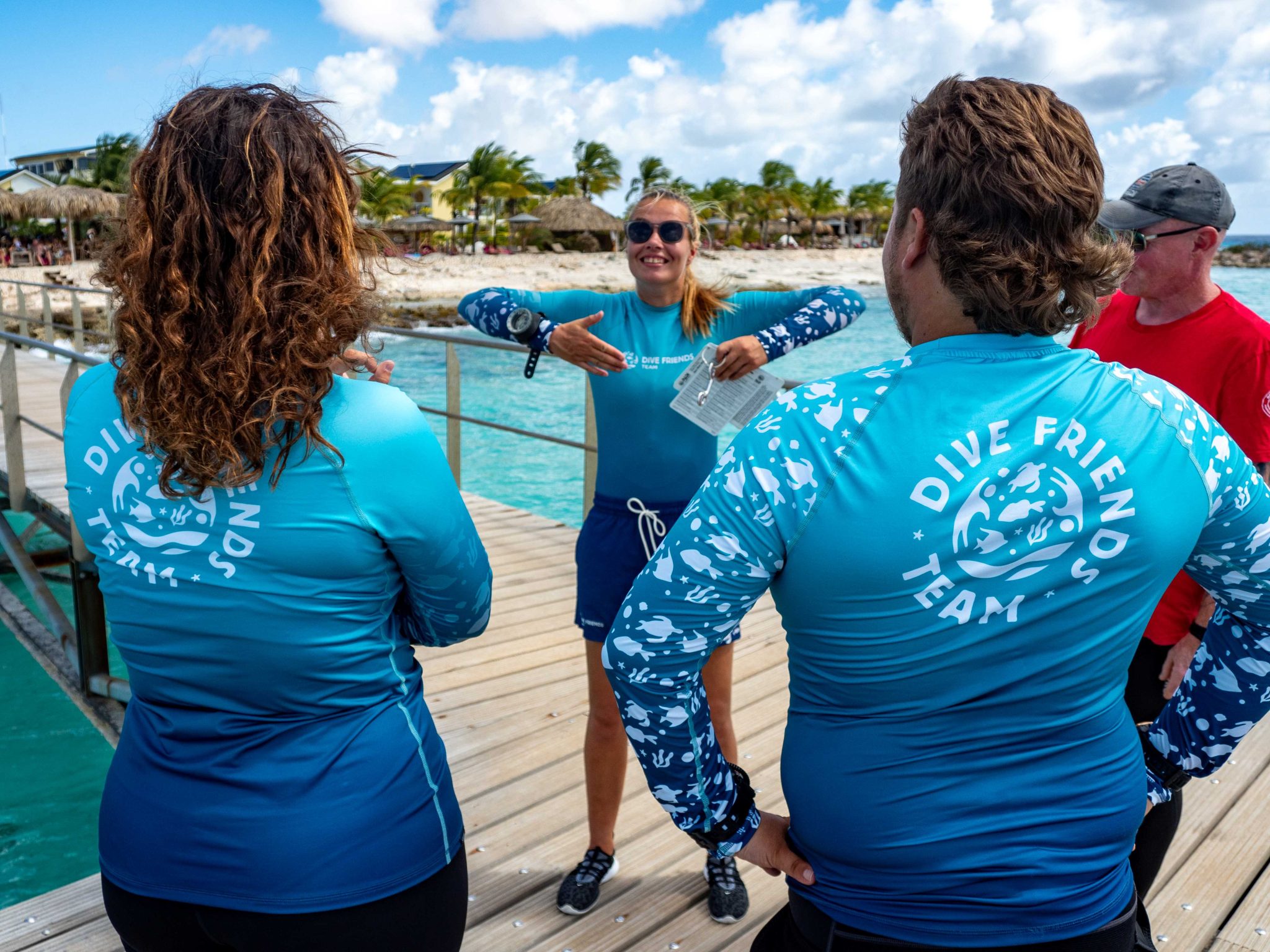
Dive Friends teaches the Instructor Development Course (IDC) several times a year to students who are eager to share their passion for diving with the world.
Dive Friends is known for the personal approach throughout the course. Their in-house course director will lead the students through every essential step, mentoring them to achieve their fullest potential as a dive instructor.
Applications for the following IDC start dates are now open:
- 12 April
- 5 July,
- 20 September
- 29 November
Partnership with Casita Palma
If the student opts for the IDC-Deluxe or IDC-Supreme package, their accommodation will be arranged for them at Casita Palma. This small and quiet resort is within walking distance from Dive Friends Bonaire’s main dive shop location and has everything you need to relax after an intense day of IDC training. Breakfast is included, so the student will always be fuelled and ready for their day.
Contact Dive Friends Bonaire’s Course Director Eddy for more information: coursedirector@divefriendsbonaire.com.
-

 News3 months ago
News3 months agoHone your underwater photography skills with Alphamarine Photography at Red Sea Diving Safari in March
-

 News3 months ago
News3 months agoCapturing Critters in Lembeh Underwater Photography Workshop 2024: Event Roundup
-

 Marine Life & Conservation Blogs2 months ago
Marine Life & Conservation Blogs2 months agoCreature Feature: Swell Sharks
-

 Blogs2 months ago
Blogs2 months agoMurex Resorts: Passport to Paradise!
-

 Blogs2 months ago
Blogs2 months agoDiver Discovering Whale Skeletons Beneath Ice Judged World’s Best Underwater Photograph
-

 Marine Life & Conservation2 months ago
Marine Life & Conservation2 months agoSave the Manatee Club launches brand new webcams at Silver Springs State Park, Florida
-

 Gear Reviews3 months ago
Gear Reviews3 months agoGear Review: Oceanic+ Dive Housing for iPhone
-

 Gear Reviews2 weeks ago
Gear Reviews2 weeks agoGEAR REVIEW – Revolutionising Diving Comfort: The Sharkskin T2 Chillproof Suit















